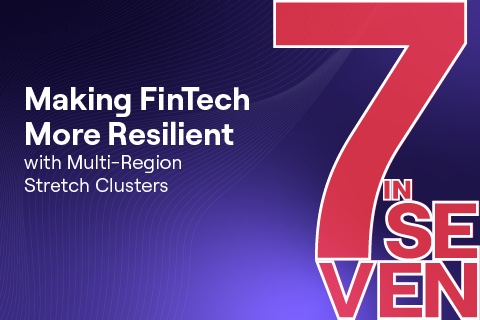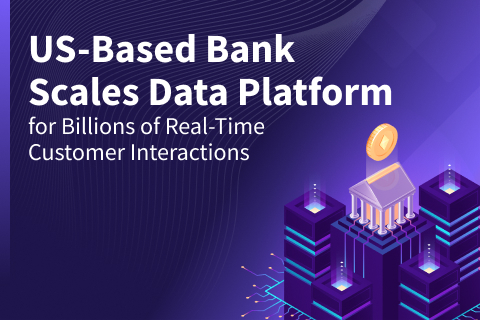The Future of Money and Financial Services
Every October, Las Vegas hosts Money 20/20 USA, the premier event for fintech and financial service innovators. Money 20/20 isn’t just a conference; it’s where global finance, payment, and fintech visionaries come together to define the future of all things money.
Representing YugabyteDB and our powerful distributed PostgreSQL database (used by many companies in attendance), we engaged with these industry leaders and extracted key takeaways about the future of finance.

Five Key Takeaways About the Future of Finance
Trust and AI: Building Trust in the Banking Industry with Ethical AI
Many conversations at Money 20/20 centered about how trust and reputation are everything.
For traditional banks, trust and reputation is the gold standard. As we edge into an exciting new phase of artificial intelligence (AI), harnessing it to safeguard this trust will be crucial.
AI is a powerful tool. But it is also evident that financial organizations are working hard to integrate it in ways that align with ethical standards, principles, and data transparency. As we move into the era of data and AI, steadfast adherence to these ethical values will be key and will define how the industry moves forward.
Balancing AI with Human Elements
AI brings remarkable potential to the table, especially in areas like underwriting and lending. However, human oversight will guarantee its ethical and responsible use. AI is not yet to the point where it can yet replicate human cognition and our decision-making process entirely. While AI can collect vast amounts of data, its effectiveness depends on humans to correct errors and enhance its ability to learn, ensuring the data outcome’s relevance and accuracy.
Quantum Computing and the Future of Encryption
The buzz at Money 20/20 was clear—quantum computing from cloud providers is challenging traditional encryption methods, nudging them from the first place spot on the podium.
But it also became clear that we can’t ignore the need for stronger digital security measures. Collaboration is crucial as the financial service sector seeks new ways to adapt and protect data. There’s a call for payment networks and issuers to embrace quantum-resistant cryptographic techniques and come together to fortify the digital landscape against emerging threats.
Optimism and Opportunity
But quantum computing presents a world of opportunities, too. The chatter at Money 20/20 highlighted its potential to simulate risk scenarios and spot irregular patterns indicative of fraud. The bottom line? Approach this frontier with caution and optimism while recognizing its potential.
Don’t Lose Focus on Payments
There were many conversations at Money 20/20 about emerging tech, but at the end of the day, payments are core to all of it. Delivering fast, secure, and consistent payment experiences is no longer a requirement to be negotiated. Real-time payments are an industry standard.
The Clearing House is making significant progress in real-time payments as more financial institutions join its Real-Time Payments Network while also onboarding corporate customers for real-time payment (RTP) transactions.
With the inclusion of the Federal Reserve’s FedNow, faster payments are moving from concept to reality, leading to a shift in customer expectations rather than just interest. Many of the panels at Money 20/20 were filled with payments experts who discussed the factors influencing RTP, B2B, and embedded payments as these faster payment options evolve.

Latin America Opportunities
Latin America (particularly Brazil) made a big impact at Money 20/20, emphasizing its status as a growing and rapidly evolving market. This spike stems from its vast unbanked population, young demographic, and a striking 20–30% eCommerce sector growth rate.
There’s been a remarkable surge of growth and opportunities in areas like digital identity, fraud mitigation, and financial inclusion. Two primary catalysts propel this growth.
- Championing Financial Inclusion. Financial inclusion continues to be a critical goal in LATAM; it’s closely linked to digital identity. The region is working towards harnessing digital identity to expand the financial ecosystem’s reach across more individuals and businesses. For many, digital identity represents the key to equitable development and inclusive growth.
- Rising Synthetic Identity Fraud: Synthetic identity fraud is a growing concern in LATAM and continues to be a significant trend, particularly in a region where nearly one-fifth of total revenue is lost to fraud.
5. The Ongoing Importance of Partnerships and Thriving Ecosystems
Partnerships foster innovation. Ecosystems should be built around the right partners to create value, and partnerships should be mutually beneficial. That is as true today as it will be next year (and the year after that).
- Consolidation in the Payments Industry: Consolidation is a natural evolution in maturing industries. This is particularly true in the payments sector where consolidation is paving the way for enhanced efficiency, scalability, and market expansion.
- Efficiency and Economies of Scale: Consolidation benefits businesses by allowing them to operate more effectively and access previously untapped resources.
- Slower VC Deployment: The volume of venture capital allocation into Fintech continues to shift as Limited Partners (LPs) decelerate their investments. External factors, like the denominator problem, have played a part in changing the VC investment cadence due to the conservative market we are in.
- The Future of Work: There have been lots of discussions about how the future of work is evolving, with a trend towards people having multiple careers simultaneously. The new way of work includes side gigs, freelancing, and even full-blown self-employment, especially for GenZ’s and Gen Alphas. This shift requires that financial services firms adapt to the changing needs of these non-traditional employees. Financial services need to be agile, recalibrating their offerings to cater to the nuanced demands of a modern workforce.

In Conclusion, the Common Thread is Data
Data’s significant role in all five of these trends (in particular AI and payments) cannot be overstated.
Cloud native YugabyteDB meets many (if not most) of the new demands that financial services firms face:
- Global Scale: Scalability is at the core of our platform, enabling businesses to grow without limitations while providing users with real-time access to their data.
- Built-in Resilience: Our database was designed with built-in resilience, a fundamental element in safeguarding against the unexpected.
- Enhanced Security at the Database Level: In an era where real-time payments are vulnerable to fraud, our enhanced security measures at the database level act as a shield against these risks.
- Deployment Flexibility: Our database is flexible enough to adapt to any deployment scenario, whether cloud-based, on-prem, or container-driven, ensuring financial services firms can tailor their services and solutions as needed.
- Transactional Consistency: YugabyteDB provides robust transactional data consistency, which is crucial in the world of real-time payments, where precision is of utmost importance.
Why So Many Financial Services Firms Picked Up YugabyteDB
Yugabyte is an established presence within many fintechs, payments, and financial services firms. These partnerships span many well-known names (Fiserv, Wells Fargo, Airwallex, to name a few).
Our proven expertise includes:
- Payment networks
- Issuers and wallet providers
- Commerce platforms/PSPs/merchant aggregators/SRC
We empower these stakeholders to construct high-performing, synchronous, zero-data-loss platforms, powering their financial services into the future. To learn more about how our database works well for financial services book a free demo today.



